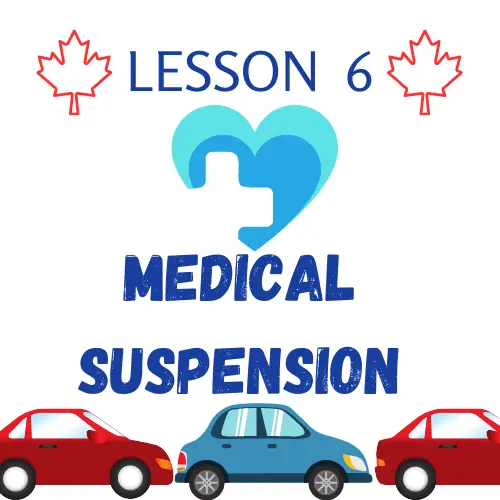Medical suspensions in driving are regulatory measures designed to ensure road safety. This article investigates the subtleties of clinical suspensions in driving inside the Canadian system, looking at their suggestions for public wellbeing, individual freedoms, and the difficulties in finding some kind of harmony between them.
Clinical Wellness to Drive:
In Canada, common and regional transportation specialists are responsible for laying out and authorizing guidelines connected with driver permitting, including evaluating clinical wellness to drive. Drivers are for the most part, expected to self-report any ailments or debilitations that could affect their capacity to securely drive. Moreover, medical care experts might be commanded to report patients whose ailments represent a gamble out and about.
Normal Ailments Prompting Suspensions:
Different ailments can provoke a clinical suspension in driving. These may incorporate, however are not restricted to, uncontrolled epilepsy, huge vision weakness, mental impedances like dementia, extreme cardiovascular circumstances, and certain mental issues. The objective is to guarantee that drivers with ailments that undermine their capacity to drive securely are recognized and overseen fittingly.
Administrative Systems:
Clinical suspensions can take various structures relying upon the seriousness of the ailment and the related dangers. A few territories and domains utilize transitory suspensions, giving drivers to recover their rights once their ailment settles or gets to the next level. Long-lasting suspensions might be upheld in situations where the ailment is irreversible or represents a tenacious gamble to street security. Drivers may be granted conditional licenses that allow them to continue driving under certain conditions.
Suggestions for Public Security:
Guaranteeing public wellbeing is a foremost worry with regards to clinical suspensions in driving. The reasoning behind these actions is to relieve the gamble of mishaps brought about by impeded drivers. Conditions like uncontrolled seizures, extreme visual debilitation, or mental degradation can fundamentally weaken an individual’s capacity to pursue fast and sound choices out and about, representing a threat to essentially everyone.
Adjusting Individual Freedoms:
While focusing on open wellbeing is pivotal, the execution of clinical suspensions brings up significant issues about the freedoms of people with ailments. Finding some kind of harmony between defending public wellbeing and regarding the freedoms of people to individual portability is a fragile errand. The test lies in finding systems that distinguish and oversee takes a chance without lopsidedly encroaching on the independence and privileges of people with ailments.
Considerations and Challenges:
1. ** Medical Assessment Subjectivity:** Surveying a singular’s wellness to drive in view of ailments can be emotional, and different medical care experts might decipher rules in an unexpected way. Laying out normalized models for clinical evaluations is significant to guarantee consistency and reasonableness.
2. ** Impact on Individuality:** Losing the capacity to drive can have significant ramifications on a singular’s autonomy and personal satisfaction. It might influence work, social communications, and admittance to fundamental administrations. Tracking down ways of supporting people through elective transportation choices becomes fundamental.
3. Disgrace and Mental Health: A person’s mental health and social standing can be negatively impacted due to their driver’s license suspended for a medical condition. Guaranteeing that help administrations are accessible for impacted people is significant for their general prosperity.
4. ** Technologies for People with Disabilities:** With continuous headways in assistive advances, a few people with ailments might have the option to drive securely with the guide of versatile gadgets. Guaranteeing that the administrative system obliges these innovative progressions is fundamental.
Strategy Proposals:
1. ** Normalized Clinical Assessments:** Laying out normalized clinical appraisal rules can add to consistency in assessing people’s wellness to drive. Coordinated effort between medical services experts, transportation specialists, and pertinent partners is fundamental in accomplishing this.
2. ** Alternatives to Accessible Transportation:** Creating and advancing available transportation options is significant to help people who have had their driving honors suspended. This might incorporate better open transportation, local area administrations, and ride-sharing choices.
3. ** Schooling and Awareness:** Improving government funded schooling and mindfulness with respect to the connection between ailments and it is vital for drive security. This can add to a superior comprehension of the reasoning behind clinical suspensions and decrease the related disgrace.
4. Standard Audit of Guidelines: Occasional audit and refreshing of rules for clinical suspensions in view of arising exploration and progressions in clinical and assistive advancements are important to guarantee that the guidelines stay pertinent and fair.

Medical suspension Conclusion:
Clinical suspensions in driving are a perplexing and touchy issue that requires a nuanced approach. Adjusting the goals of public security with the privileges and prosperity of people with ailments is a persistent test. As Canada wrestles with a maturing populace and the rising predominance of specific ailments, finding viable and sympathetic arrangements becomes fundamental. It is possible to strike a balance that prioritizes road safety while respecting the rights and dignity of individuals facing medical suspensions from driving through collaboration between healthcare professionals, policymakers, and the community.
